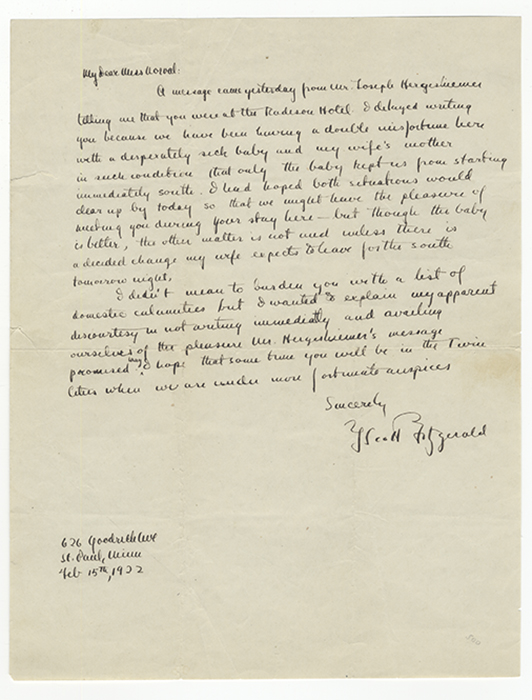
"I DON'T MEAN TO BURDEN YOU WITH A LIST OF DOMESTIC CALAMITIES…": FINE 1922 SIGNED AUTOGRAPH LETTER FROM F. SCOTT FITZGERALD TO A FRIEND OF HIS FRIEND, ACCLAIMED AUTHOR JOSEPH HERGESHEIMER, APOLOGIZING FOR BEING TOO BUSY TO MEET DUE TO THE HEALTH PROBLEMS OF HIS BABY AND MOTHER-IN-LAW
FITZGERALD, F. Scott. Autograph letter signed. St. Paul, Minnesota, February 15, 1922. Single sheet of unlined paper, measuring 8-1/2 by 11 inches, with hand-addressed mailed envelope. $14,500.
Exceptional signed autograph letter, written entirely in F. Scott Fitzgerald's hand, apologizing for failing to arrange a meeting with Lucy Norval, a friend of author Joseph Hergesheimer (a friend and competitor of Fitzgerald), due to a "desperately sick" baby and an equally sick mother-in-law, the latter of whom Fitzgerald anticipated traveling south to visit thus preventing the meeting.
The letter, written entirely in F. Scott Fitzgerald's hand and dated "Feb 15th, 1922," reads: "My dear Miss Norval: A message came yesterday from Mr. Joseph Hergesheimer telling me that you were at the Radisson Hotel. I delayed writing you because we have been having a double misfortune here with a desperately sick baby and my wife's mother in such condition that only the baby kept us from starting immediately south. I had hoped both situations would clear up by today so that we might have the pleasure of meeting you during your stay here—but though the baby is better, the other matter is not unless there is a decided change my wife expected to leave for the south tomorrow night. I didn't mean to burden you with a list of domestic calamities but I wanted to explain my apparent discourtesy in not writing immediately and availing ourselves of the pleasure Mr. Hergesheimer's message promised. May I hope that some time you will be in the Twin Cities when we are under more fortunate auspices. Sincerely, F. Scott Fitzgerald."
This letter expresses Fitzgerald's regret over being unable to meet author Joseph Hergesheimer's friend, Lucy Norval, at Saint Paul's Radisson Hotel due to family health crises—of unclear validity; Fitzgerald was celebrating the publication of The Beautiful and the Damned and begging friends for money just a few days later. Fitzgerald had a long, mercurial acquaintance with Hergesheimer, during which he vacillated between deriding Hergesheimer's work and lauding his literary accomplishments. The pair met when Fitzgerald went to his favorite bookshop and encountered Hergesheimer, "approaching him at the height of his lucrative fame. 'Mr. Hergesheimer,' said Fitzgerald, 'a writer's life is full of bitterness, frustration, and despair. Don't you think it would be better to be born with a talent for, say, carpentry'… 'For Christ's sake!' [Hergesheimer] snapped, 'I lived for years in the mountains of Virginia, eating hominy grits and black-eyed peas and writing on a broken-down machine before I sold one Goddamned line. And you talk to me about despair!' (Turnbull, 128). They went on to be close acquaintances—even friends—engaging in outings with friends to yacht clubs and the like.
Hergesheimer began his career as the writer of historical romances, but his "later works explore the manners and milieu of America in the 1920s in a way that bears comparison with F. Scott Fitzgerald" (Stringer, 299). In an October 1925 letter to his friend, Maxwell Perkins, Fitzgerald wrote: "Gatsby is just the sort of book which the English say that Americans can't write, which they praise Hergesheimer for almost writing." Indeed, Hergesheimer was the father of literary aestheticism and Gatsby was arguably the finest example of the genre. However, Fitzgerald also referred to Hergesheimer's work as "vile" and "awful" to mutual friends. He also jealously assessed Hergeheimer's work in an August 1935 letter to Margaret Case Harriman: "Of course he is more established than I am, in the same way that Hugh Walpole is more 'established' than D.H. Lawrence—established with whom? And I like his talent in half a dozen fine scenes and don't compare Walpole to him intellectually." Yet, when the chips were down, Fitzgerald turned to the more famous and more successful Hergesheimer. In the fall of 1935, he wrote to Hergesheimer begging him to reassess his views of Tender Is the Night, arguing that the presence of an actress was just a "catalytic agent" and thus Hergesheimer's contention that it was "almost impossible to write a book about an actress" wasn't relevant. The accompanying envelope is addressed in Fitzgerald's hand to Lucy Norval at the Radisson Hotel Minneapolis, but bears an autograph correction in an unidentified hand sending it care of McKesson & Robbins in New York.
A couple small closed marginal tears and faint marginal smudges. A very nearly fine copy.